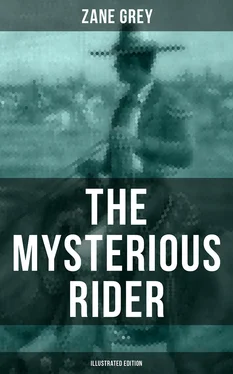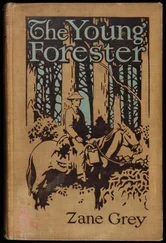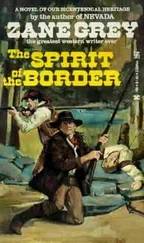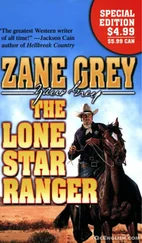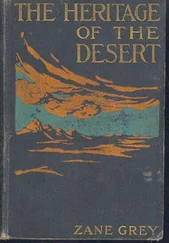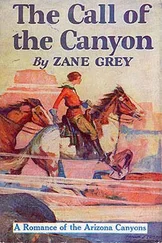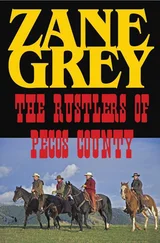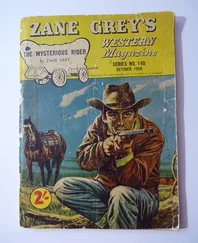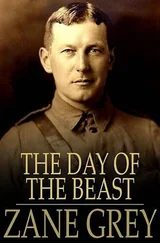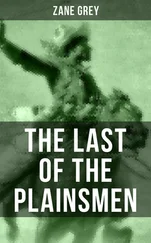"Lem, that is not all," said Columbine, earnestly, as the cowboy concluded. Her knowledge of the range told her that Lem had narrated nothing so far which could have been cause for his cold, grim, evasive manner; and her woman's intuition divined a catastrophe.
"Nope.... Wils's hoss fell on him."
Lem broke that final news with all a cowboy's bluntness.
"Was he hurt-- Lem !" cried Columbine.
"Say, Miss Collie," remonstrated Lem, "we're doctorin' up your hoss. You needn't drop everythin' an' grab me like thet. An' you're white as a sheet, too. It ain't nuthin' much fer a cowboy to hev a hoss fall on him."
"Lem Billings, I'll hate you if you don't tell me quick," flashed Columbine, fiercely.
"Ahuh! So thet's how the land lays," replied Lem, shrewdly. "Wal, I'm sorry to tell you thet Wils was bad hurt. Now, not real bad!... The hoss fell on his leg an' broke it. I cut off his boot. His foot was all smashed. But thar wasn't any other hurt--honest! They're takin' him to Kremmlin'."
"Ah!" Columbine's low cry sounded strangely in her ears, as if some one else had uttered it.
"Buster Jack made two bursts this hyar day," concluded Lem, reflectively. "Miss Collie, I ain't shore how you're regardin' thet individool, but I'm tellin' you this, fer your own good. He's bad medicine. He has his old man's temper thet riles up at nuthin' an' never felt a halter. Wusser'n thet, he's spoiled an' he acts like a colt thet'd tasted loco. The idee of his ropin' Pronto right thar near the round-up! Any one would think he jest come West. Old Bill is no fool. But he wears blinders when he looks at his son. I'm predictin' bad days fer White Slides Ranch."
Table of Contents
Only one man at Meeker appeared to be attracted by the news that Rancher Bill Belllounds was offering employment. This was a little cadaverous-looking fellow, apparently neither young nor old, who said his name was Bent Wade. He had drifted into Meeker with two poor horses and a pack.
"Whar you from?" asked the innkeeper, observing how Wade cared for his horses before he thought of himself. The query had to be repeated.
"Cripple Creek. I was cook for some miners an' I panned gold between times," was the reply.
"Humph! Thet oughter been a better-payin' job than any to be hed hereabouts."
"Yes, got big pay there," said Wade, with a sigh.
"What'd you leave fer?"
"We hed a fight over the diggin's an' I was the only one left. I'll tell you...." Whereupon Wade sat down on a box, removed his old sombrero, and began to talk. An idler sauntered over, attracted by something. Then a miner happened by to halt and join the group.
Next, old Kemp, the patriarch of the village, came and listened attentively. Wade seemed to have a strange magnetism, a magic tongue.
He was small of stature, but wiry and muscular. His garments were old, soiled, worn. When he removed the wide-brimmed sombrero he exposed a remarkable face. It was smooth except for a drooping mustache, and pallid, with drops of sweat standing out on the high, broad forehead; gaunt and hollow-cheeked, with an enormous nose, and cavernous eyes set deep under shaggy brows. These features, however, were not so striking in themselves. Long, sloping, almost invisible lines of pain, the shadow of mystery and gloom in the deep-set, dark eyes, a sad harmony between features and expression, these marked the man's face with a record no keen eye could miss.
Wade told a terrible tale of gold and blood and death. It seemed to relieve him. His face changed, and lost what might have been called its tragic light, its driven intensity.
His listeners shook their heads in awe. Hard tales were common in Colorado, but this one was exceptional. Two of the group left without comment. Old Kemp stared with narrow, half-recognizing eyes at the new-comer.
"Wal! Wal!" ejaculated the innkeeper. "It do beat hell what can happen!... Stranger, will you put up your hosses an' stay?"
"I'm lookin' for work," replied Wade.
It was then that mention was made of Belllounds sending to Meeker for hands.
"Old Bill Belllounds thet settled Middle Park an' made friends with the Utes," said Wade, as if certain of his facts.
"Yep, you have Bill to rights. Do you know him?"
"I seen him once twenty years ago."
"Ever been to Middle Park? Belllounds owns ranches there," said the innkeeper.
"He ain't livin' in the Park now," interposed Kemp. "He's at White Slides, I reckon, these last eight or ten years. Thet's over the Gore Range."
"Prospected all through that country," said Wade.
"Wal, it's a fine part of Colorado. Hay an' stock country--too high fer grain. Did you mean you'd been through the Park?"
"Once--long ago," replied Wade, staring with his great, cavernous eyes into space. Some memory of Middle Park haunted him.
"Wal, then, I won't be steerin' you wrong," said the innkeeper. "I like thet country. Some people don't. An' I say if you can cook or pack or punch cows or 'most anythin' you'll find a bunk with Old Bill. I understand he was needin' a hunter most of all. Lions an' wolves bad! Can you hunt?"
"Hey?" queried Wade, absently, as he inclined his ear. "I'm deaf on one side."
"Are you a good man with dogs an' guns?" shouted his questioner.
"Tolerable," replied Wade.
"Then you're sure of a job."
"I'll go. Much obliged to you."
"Not a-tall. I'm doin' Belllounds a favor. Reckon you'll put up here to-night?"
"I always sleep out. But I'll buy feed an' supplies," replied Wade, as he turned to his horses.
Old Kemp trudged down the road, wagging his gray head as if he was contending with a memory sadly failing him. An hour later when Bent Wade rode out of town he passed Kemp, and hailed him. The old-timer suddenly slapped his leg: "By Golly! I knowed I'd met him before!"
Later, he said with a show of gossipy excitement to his friend the innkeeper, "Thet fellar was Bent Wade!"
"So he told me," returned the other.
"But didn't you never hear of him? Bent Wade? "
"Now you tax me, thet name do 'pear familiar. But dash take it, I can't remember. I knowed he was somebody, though. Hope I didn't wish a gun-fighter or outlaw on Old Bill. Who was he, anyhow?"
"They call him Hell-Bent Wade. I seen him in Wyomin', whar he were a stage-driver. But I never heerd who he was an' what he was till years after. Thet was onct I dropped down into Boulder. Wade was thar, all shot up, bein' nussed by Sam Coles. Sam's dead now. He was a friend of Wade's an' knowed him fer long. Wal, I heerd all thet anybody ever heerd about him, I reckon. Accordin' to Coles this hyar Hell-Bent Wade was a strange, wonderful sort of fellar. He had the most amazin' ways. He could do anythin' under the sun better'n any one else. Bad with guns! He never stayed in one place fer long. He never hunted trouble, but trouble follered him. As I remember Coles, thet was Wade's queer idee--he couldn't shake trouble. No matter whar he went, always thar was hell. Thet's what gave him the name Hell-Bent.... An' Coles swore thet Wade was the whitest man he ever knew. Heart of gold, he said. Always savin' somebody, helpin' somebody, givin' his money or time--never thinkin' of himself a-tall.... When he began to tell thet story about Cripple Creek then my ole head begun to ache with rememberin'. Fer I'd heerd Bent Wade talk before. Jest the same kind of story he told hyar, only wuss. Lordy! but thet fellar has seen times. An' queerest of all is thet idee he has how hell's on his trail an' everywhere he roams it ketches up with him, an' thar he meets the man who's got to hear his tale!"
Sunset found Bent Wade far up the valley of White River under the shadow of the Flat Top Mountains. It was beautiful country. Grassy hills, with colored aspen groves, swelled up on his left, and across the brawling stream rose a league-long slope of black spruce, above which the bare red-and-gray walls of the range towered, glorious with the blaze of sinking sun. White patches of snow showed in the sheltered nooks. Wade's gaze rested longest on the colored heights.
Читать дальше
